What a tragedy that David Gordon Green, who looked like the new Terrence Malick back in the days of George Washington, has devolved into a manifestation of late-career Mel Brooks. Green’s last, Pineapple Express, was clever and liberating — a near-perfect surprise. Your Highness is a low-rent mulching of A Knight’s Tale, The Princess Bride, The Year One and A History of the World, Part 1 by way of 2010 throwaway humor, and smeared with the fart-joke sensibility of the bloated Danny McBride.
Bloomberg-Scarborough
This morning Morning Joe host Joe Scarborough ridiculed a speculative piece by the Huffington Post‘s Howard Fineman. It said that “well-placed sources” are saying that Scarborough and New York Mayor Michael Boomberg “have begun trying to figure out whether they could be an independent presidential ticket in 2012 [and] have talked about running together, with Bloomberg in the top spot.” I listened to Scarborough deny it all from various angles, and he wasn’t low-key about it — he was borderline angry.
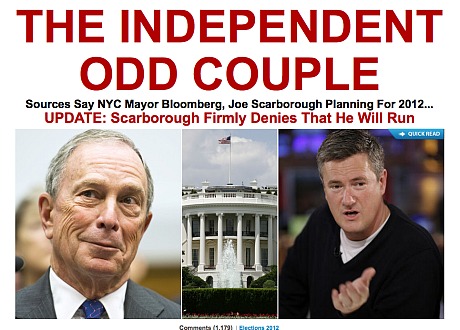
But the instant I read Fineman’s article I could hear a little gear clicking into place. Right now there are no clubhouse Republicans or tea-party wackos with anything close to the kind of charismatic heft necessary to generate serious excitement about a 2012 run at the White House. Nobody. But Bloomberg-Scarborough — a couple of reasonable, right-center, practical-minded corporate ass-kissers who won’t do anything brilliant or revolutionary but are clearly not looney-tunes — do have that charisma. If they were to actually run, Obama-Biden might have something to worry about.
If America can elect an African-American to the White House, it can certainly elect a Jew.
"Tripped Up A Bit…"
N.Y. Times media reporter David Carr and others have joked that the forthcoming merger of The Daily Beast and Newsweek should be called Newsbeast. But don’t laugh — the sound of it works. I’m actually a bit surprised that searches still aren’t finding any professional-looking Newsbeast logos. What else are they gonna call it?
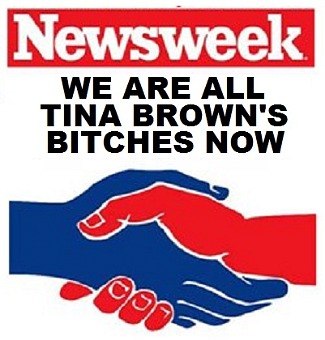
“Tina Brown‘s Daily Beast reportedly loses $10 million a year, and in 2009 Newsweek lost $28 million ,” the N.Y. Observer‘s Nick Summers (a former Newsweek staffer) writes in a just-posted article. “The premise that together the two will somehow make money has struck more than a few people as insane — but the bleeding may be more stoppable than people realize.”
It “may” be “more” stoppable? As opposed to less stoppable or comme ci comme ca stoppable? Somebody explain how “stopping the bleeding” = gradually profitable. Why is it that the financial algebra behind big-media deals like this one always sounds like mystifying gobbledygook?
“The print-ad market [is] coming back,” Summers explains early on. “Newsweek‘s name would add credibility as the Beast grew. And the world of magazine pages, Ms. Brown’s old stomping ground, beckon[s].” Newsweek as currently constituted (minus a recently departed “editor, int’l editor, the editor-at-large, a senior Washington correspondent, a diplomatic correspondent, the executive editor, two editorial directors, two deputy editors, the economics editor, an economics correspondent, two lead investigative reporters, the White House reporter, an international editor plus the website’s editor, general manager, managing editor and three articles editors”) is a shell of its former self. That was then, this is now, and Newsweek is for all intensive purposes a corpse with a “name.”
“Ms. Brown’s name brings in print-ad dollars all by itself,” Summers continues. “Newsweek‘s move from pricey West Village digs to [a] dodgy space at 7 Hanover Square will save $6.3 million in rent and operating costs alone. And there will be layoffs as the two staffs merge. (The incentive is to make those cuts from the Newsweek side of things, as the Washington Post Co. has agreed to cover some of those costs for up to one year.)
“Ms. Brown opposed the merger as late as last Tuesday morning. Three weeks prior, she appeared visibly relieved in the Beast newsroom when negotiations broke down, even reaching a level of Zen when it was clear she would not have to deal with the daunting logistics of a merger.
“Now she does. And she already works around the clock. The Observer asked: Where will she get the extra time?
“‘Well, my kids are grown up,’ Ms. Brown said softly. ‘And I’ve this theory that as you get older, you work harder.’ The absence of children creates a hole best filled by work, she said — ‘otherwise you’ll just feel mournful.’
“Ms. Brown, who gets tripped up a bit talking about the future of Newsweek.com, speaks calmly and clearly about her plans for the print magazine. She wants to be carefully organized and not rush into hiring. There will be no gaudy ‘first Tina’ issue. Things will improve gradually. ‘One is ready when one is ready,’ she said. ‘I know what it takes; I know what I’m able to do.’
“To speak with her about what to do with a magazine, even one so battered as Newsweek, is to believe in the magic of dead trees and ink.
“Oh my God. This is really going to happen.”
Rabbit Hole in Tribeca
I caught John Cameron Mitchell‘s Rabbit Hole (Lionsgate, 12.17) for the second time this evening. It hasn’t diminished a bit since I last saw it at the Toronto Film Festival; if anything, it’s gained. It’s a sad, honest and fully engaged thing, and never the least bit boring. It has no weak scenes — each is gamey, steady and true, and adds another layer to a whole that becomes more and more intriguing as it goes along. Really — this is not Oscar bloggie blather.
Every actor in the cast nails it with verve and snap, but especially Nicole Kidman, Dianne Wiest, Aaron Eckhart and (in his motion picture debut) Miles Teller.
I take it back about Rabbit Hole being an A-minus — I’m now calling it a solid A, and I still have no doubt about its ability to penetrate as a Best Picture contender. I’m not just “saying” this. It really is a keeper; it holds itself together and deepens the game and spreads out and sinks in a step-by-step basis.
Kidman, Weist, Eckhart and Teller joined Mitchell and moderator Eugene Hernandez for a chat following tonight’s screening at the Tribeca Cinemas. Also participating were production designer Kalina Ivanov and a gentleman who may have been cinematographer Frank G. DeMarco. (I’ll confirm Wednesday morning — sorry.)
Rabbit Hole is a restrained/contained middle-class grief drama in the vein of Ordinary People and In The Bedroom (i.e., dead son). David Lindsay-Abaire‘s screenplay (based on his play) never lays it on too thick, but doesn’t hold back too much either. It’s a process drama about keeping the trauma buried or at least suppressed, and about how it comes out anyway — a little hostility here and there, odd alliances and connections, a little hash smoking (a la American Beauty), stabs at organized grief therapy, questions of whether to keep or get rid of the son’s toys.
It finally explodes in a bracing argument scene between Kidman and Eckhart, and then it subsides again and comes back and loop-dee-loops and finally settles down into a kind of acceptance between them. Not a peace treaty as much as an understanding that overt hostilities will cease.
A few people applauded at the end of the TIFF press screening that I attended. They also applauded big-time this evening. This is a very well honed, entirely respectable, honestly affecting drama. There’s no doubting and disengaging from any of it.
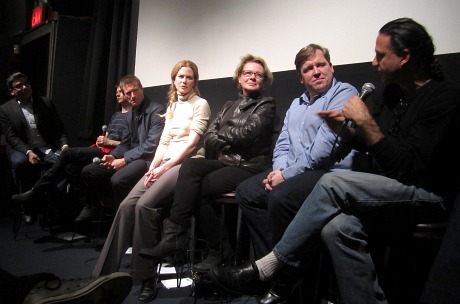
The Rabbit Hole gang during post-screening discussion at Tribeca Cinemas — Tuesday, 11.16, 9:35 pm — (l. to r.) moderator Eugene Hernandez, director John Cameron Mitchell, Aaron Eckhart, Nicole Kidman, Dianne Wiest, screenwriter David Lindsay-Abaire.
Fast Read
Unlike myself, a friend has found the time to finish a 6.23.10 draft of Natalie Portman and Laura Moses‘ BYO, which I was sent yesterday. L.A. Times reporter Stephen Zeitchik recently described it as a “raunchy, female-themed Superbad comedy.” But “it doesn’t have any serious Jonah Hill-like vulgarity,” my colleague says. “Just lots of Michael Cera snarkiness and McLovin dopey-ness.”
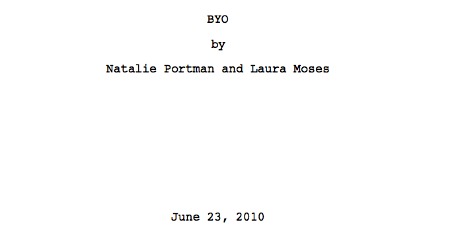
The two main characters are Lucy and “Al” (short for Alice) — Lucy is the wild sex fiend and Al is the more or less level-headed one. There’s a scene on page five in which Lucy is caught blowing a 15 year-old by the teen’s mother. (I read about ten pages so even I got that far.) “There is one other sex scene,” my friend says, “but who knows what it’ll be. Let’s just say it doesn’t get any dirtier than the page-five BJ.”
“I can see it being funnier acted out,” he adds. “It just seems lurid because it’s about chicks acting like horny dudes.”
Good God
Longtime Hollywood publicist Ronni Chasen was found shot to death in her car early this morning with — I can’t believe I’m reading this — multiple gunshot wounds to the chest, according to TheWrap‘s Brent Lang. Beverly Hills police “would not confirm that the victim was Chasen, but did tell TheWrap that a woman was found in her car early Tuesday with multiple gunshot wounds to the chest,” Lang wrote.

Chasen “had apparently crashed her car into a lightpole around 12:28 a.m. near Sunset and Whittier. Beverly Hills police said that there were no suspects, no known motive and that the investigation was under way. Chasen was believed to be returning from the world premiere of Burlesque, the Cher movie. The Hollywood publicity machine was in shock over the news.”
HE offers hugs and condolences to Chasen’s family (including director Larry Cohen, her brother) and coworkers/associates. I’ve known and worked with Ronni for years and always found her tough, sharp and fair. This is more than tragic — it’s surreal. What could have happened? All I can think is that one or two shots is a gunman looking to kill someone, but five in the chest is rage.

O'Neil and Pond
“The King’s Speech looks like a perfect Oscar movie, but it’s not any more. I’m not confident in that. Even though it plays much funnier and lighter and not so stuffy as you might think, It doesn’t seem like a movie of the moment, whereas The Social Network does.” — TheWrap columnist Steve Pond speaking to Gold Derby‘s Tom O’Neil.
And yet, Pond adds, “Is The Social Network the movie of the moment for most Academy members, or is it the movie of the moment for people who are younger?
Deadly
Missing in Mike Fleming‘s Deadline report about Carey Mulligan landing the part of Daisy Buchanan in Baz Luhrman‘s adaptation of The Great Gatsby is any sense of what an absolute stiff the 1974 Robert Redford-Mia Farrow-Bruce Dern version was, and what may happen when Luhrman begins to wrestle with the ghost of F. Scott Fitzgerald.

Pic of Carey Mulligan taken by Lurhman during a recent audition, and then supplied to Fleming for his exclusive announcement story.
Fleming is a shoe-leather guy who just writes it down and double-checks and types it out, but if he were so inclined he might also voice suspicion about the oil-and-water mixture of Luhrman’s hyperkinetic style and Fitzgerald’s elegiac 1925 novel.
I’m guessing that Gatsby‘s wistful tone — it’s a book about socially desperate people in states of dreamy-boozy lament — will almost certainly encourage Luhrman to turn up the intensity and the bombast even more than he did with Australia, which seemed to many like a tragedy of overstatement.
With Leonardo DiCaprio cast as Gatsby and Tobey Maguire as Nick Carraway (the narrator figure played by Sam Waterston in Jack Clayton‘s version), this project has “disaster” stamped all over its forehead. Perhaps if it was modernized in the manner of Luhrman’s Romeo + Juliet ? Maybe. Otherwise this feels like a train wreck in the making, a train wreck in the making, a train wreck in the making.
But agreeing to play Jay Gatsby (“old sport”) and also J. Edgar Hoover for Clint Eastwood, DiCaprio, no offense, has been on a roll in terms of taking the wrong roles for mystifying reasons.
In his review of the Clayton version, N.Y. Times critic Vincent Canby wrote that it “moves spaniel-like through F. Scott Fitzgerald’s text, sniffing and staring at events and objects very close up with wide, mopey eyes, seeing almost everything and comprehending practically nothing.
“The language is right, even the chunks of exposition that have sometimes been turned into dialogue. The sets and costumes and most of the performances are exceptionally good, but the movie itself is as lifeless as a body that’s been too long at the bottom of a swimming pool.”
Two More?
I thought yesterday morning’s kick-Harrison Ford-when-he’s-down articles (an L.A. Times/Stephen Zeitchik assessment, and a piece posted two days earlier by Atlantic Wire‘s Eric Hayden) were the end of it. Enough already. Then along came Brent Lang‘s Wrap refrain late yesterday afternoon. And today Anne Thompson has career advice in a Moviefone piece.
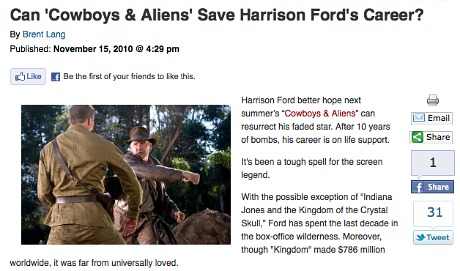
Why Of It
The vast majority of reports about the Beatles arrival on iTunes, which was announced this morning, have offered no explanations about what’s been holding this deal up for so many years. However, an article posted last night by the Wall Street Journal‘s Ethan Smith (with additional reporting from Nick Wingfield and Dana Cimilluca) provides a through-sounding history.

Pop-out #1: “People who have done business with [the Beatles] and its corporate entity, Apple Corps Ltd., describe a very slow-moving process in which the two surviving members, and the heirs of the other two, can take a long time to reach consensus.”
Pop-out #2: “The Beatles deal with iTunes was delayed in part by ongoing trademark litigation, the most recent round of which was resolved in 2007. The Beatles and iTunes have traded lawsuits since 1978, when the Beatles alleged that the computer maker, incorporated as Apple Computer in 1977, infringed on the band’s trademark in the name and logo of Apple Corps. The lawsuit was settled in 1981 for an undisclosed sum, plus an agreement that the Cupertino, Calif., computer maker wouldn’t compete in the music business.”
Pop-out #3: “The Beatles’ record label, EMI Group Ltd., has been under financial strain following an ill-timed leveraged buyout by Terra Firma Capital Partners LP in 2007. If the iTunes tie-up generates significant cash advances or sales, it could delay breaches in the company’s loan covenants. Terra Firma borrowed ¬£2.74 billion (US $4.4 billion) from Citigroup Inc. to finance the deal, but has fallen into breach of those covenants, forcing it to add millions more to its equity position last year.
Pop-out #4: “Even as recorded-music sales have plummeted, the Beatles have remained one of the most reliable franchises in the business. In 2009, 39 years after breaking up, they sold the third-highest number of albums of any act in the U.S., according to Nielsen SoundScan, with 3.3 million copies sold.”
Avoid "The" Whenever Possible
I didn’t read this 11.13 Drew McWeeny/Darren Aronofsky conversation piece until last night. Aronofsky told McWeeny that his Wolverine flick will be a “one-off” and shouldn’t be regarded as a sequel or prequel or related in any way to the X-Men franchise or Gavin Hood or anything. Aronofsky also told DW it’ll be called The Wolverine.
Right away I recoiled. I don’t like seeing “The” in any title, especially one citing the name of a superhero. I recognize that one of Heath Ledger‘s signature lines in The Dark Knight is “kill the Batman,” but a superhero is not an article like a table or a refrigerator or a car. A superhero is a myth, a force field, an icon, a tower. And most of them own their names for eternity. I’m obviously aware of The Shadow and The Green Hornet, but the use of the word “the” is generally superfluous and bothersome.
The fact that villains are agitating anti-socials allows them on some level to be called, fittingly, the Joker, the Riddler and so on. But imagine paying to see a film called The Superman or The Batman. It’s not right, not cool…stupid-sounding. So please — jettison The Wolverine.

